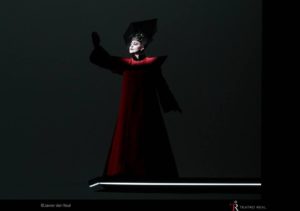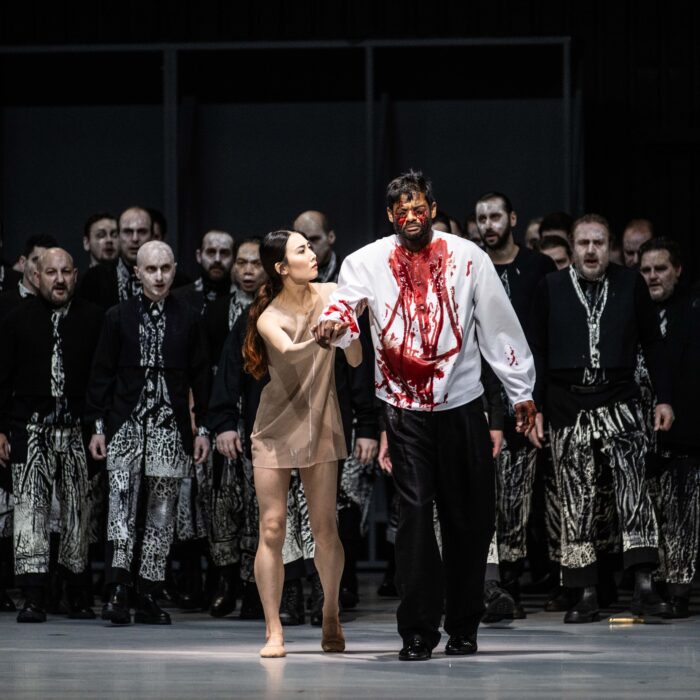
Teatro Real de Madrid 2018-19 Review: Turandot
By Mauricio VillaThere was a rather sad preamble to the premiere of Puccini’s “Turandot” at Teatro Real on the 30th of November, 2018, largely due to the cancelation of Nina Stemme in the title role. The Swedish dramatic soprano had just scored a major success during the run of Wagner’s “Der Ring des Nibelungen” at Royal Opera House, Covent Garden in London in the role of Brünhilde, but she, unfortunately, fell ill and had to cancel the production.
Fortunately, the company ensured that it had the perfect replacement on hand to lead a strong performance.
Two Heroic Stars
Soprano Irene Theorin, who was scheduled to sing three performances of this production, adjusted her agenda to take on more performances in the title role. Theorin is one of the finest dramatic sopranos around; her voice is powerful, penetrating, she can be perfectly heard over the orchestra and chorus singing in forte, as she proved in her two resonant high C’s at the end of Act two. Her “In questa reggia” was a lesson of strong singing, legato phrases, contained anger, and an exquisite attack of all the diabolic intervals from low to high notes that Puccini wrote in this part.
Above all, she has a beautiful sound, with a golden timbre and perfect vibrato; she proved that Turandot can be cruel and strong without screaming the part.
Gregory Kunde was in charge of the heroic Calaf; he has been a recurrent performer at Teatro Real where he has sung in nearly every season since his debut at this house in “Roberto Devereux” in 2015.
It will always amaze me to see the evolution of his voice from one of the best bel canto tenors in the 90`s ( we must not forget that his stratospheric tessitura permitted him to produce a high F In full voice) to one of the most efficient dramatic tenors today. There are several opinions about his timbre, but it is undeniable that his instrument is a solid one. He possesses fine vocal projection, secure high notes, and pure line. When Kunde is singing you just feel calm; there is never that tension of wondering whether a tenor might make his way through a tricky passage or high note. You know he has it under control and it is his intensity that makes him all the more exhilirating to behold. He delivered a truly impressive high C on “Ti voglio ardente” and “Nessun Dorma” displayed all of the best qualities of his singing, capped off with a thrilling high B.
Some Ups & Downs
Liù was performed by the Spanish soprano Yolanda Auyanet who possesses a beautiful lyric instrument that is able to produce the ethereal pianissimi that the part demands. The first act suited her better as she lacked the dramatic qualities in her final aria and suicide scene ¨Tu che di gel sei cinta¨ to truly connect you with the powerful sacrifice the character makes.
The characterizations of Joan Martin Royo, Vincen Esteve and Juan Antonio Sanabria as Ping, Pang and Pong were sensational; their portrayal of the three ministers as three “maschere” from “Commedia dell arte” was outstanding, even with the limitations of the stage directing which tended to verge on monotonous and repetitive.
Nicola Luisotti presented an energetic reading of the score with strong and fast tempi. He obtained a brilliant sound from the Orchestra of the Theatre, although he should have balanced the sound with the chorus. When the orchestra and chorus were at their loudest, there was no question as to which side won the volume battle; the voices were easily swallowed up by the tremendous volume coming from the pit.
An American Institution
On stage was a new co-production with the Canadian Opera Company, National Theatre of Lituania and Houston Grand Opera commissioned to Robert Wilson.
Wilson is a theatrical animal, a multidisciplinary American artist who has created his own expressive language with a meticulous use of precise movement, defined lighting, a lack of sets and decorations, and specific props that he even sometimes designs and build himself. He is an institution of the American experimental theatre.
This “Turandot” was Robert Wilson through and through and if you appreciate his work then you will not feel disappointed. However, if you are not familiar with his creations, you are either going to love or hate it. The singers perform facing the audience, though barely interacting with each other. They are mostly static, breaking this stillness with precise and define allegorical movements which remind us of the Japanese Kabuki theatre or some contemporary dance creations; the same can be said for the chorus. A clever use of “chiaroscuro” illuminates the nearly empty space.
Yes, some moments are pictorially beautiful (like the ending), but my question is: How does this impact Puccini’s epic opera?
I asked several people who had come to see “Turandot” how they felt about the production. In response to the Liù death scene, some people stated that they didn’t even realize where she died or not.
Prior to the performance the company’s Artistic Director Joan Mataboshc and Wilson walked on the stage in front of the curtain to dedicate this performance to the recently deceased soprano Monserrat Caballé. It was extremely moving to see Wilson in tears barely able to speak. It was a great start to what proved to be an enthralling production.


